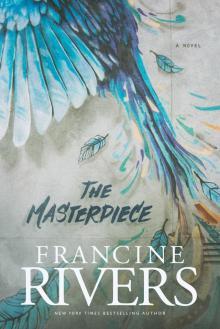- Home
- Francine Rivers
A Voice in the Wind Page 12
A Voice in the Wind Read online
Page 12
Trophimus ordered Atretes and the Briton to demonstrate. They took their places on the wheel first while a Numidian trainee manned the crank. As the post turned, Atretes jumped and ducked the sheathed sword each time. On the sixth time around, the Briton was struck squarely in the forehead and knocked backwards off the wheel. Atretes kept going.
“Faster,” Trophimus ordered.
The Numidian turned the crank harder. Atretes was tiring fast, but kept on, muscles burning. The heavy weight of food in his stomach lurched, but around and around the post swung. Trophimus stood by and watched without expression. Atretes’ chest heaved, his gorge rose. The high sword brushed his head and he barely made it over the lower one. Sweat poured down into his eyes. He glared at Trophimus and felt an explosion of pain across the bridge of his nose. He flew backwards and hit the ground heavily. Groaning, he rolled over, pushed himself up, and vomited into the dust. His broken nose gushed blood. Not far away, Gallus stood laughing at him. Crawling a few feet away from the wheel, Atretes shook his head, trying to clear it.
Trophimus ordered two others onto the wheel and came over to Atretes. “Kneel and tilt your head back.” Tharacus’ warning of castration hung over Atretes and he took the subservient position as ordered. Trophimus gripped his head, positioned the length of his thumbs on either side of his broken nose, and worked the cartilage. “Your mistake was looking at me.” Atretes clenched his teeth, afraid he was going to disgrace himself further by passing out. Blood poured down over his mouth and chin and stained the brown tunic. Trophimus didn’t take his hands away until the cartilage snapped back into place.
“The ladies like something pretty to look at,” Trophimus said with a grin. He washed his hands in a bucket of water that a slave held for him. He took the sponge from the bucket and tossed it to Atretes. “You need stamina for a good fight,” he said, drying his hands on a towel the slave handed him. “When the bleeding stops, rejoin the others.” He dropped the towel in the dust beside Atretes and turned his attention to the next two on the wheel.
Atretes pressed the dripping sponge to his throbbing face. Cool water eased the pain, but not his rage or embarrassment. He heard a thud and groan as another man was quickly struck down. “Next!” Trophimus shouted.
The afternoon wore on. Trophimus didn’t move the men to another section of the compound until every one of them had taken several turns on the wheel.
The sun rose higher, beating down on the trainees as they returned to the obstacle course. Even tired, his tunic soaked with blood and sweat, Atretes managed it without too much difficulty. He’d spent his life in the forests of Germania—running through obstacles was nothing new to him. Ducking branches, leaping roots and boulders, and zigzagging through clusters of pine were second nature.
Others who had been purchased from mines and fields stumbled and fell, gasping for breath and rising only when the whip sang through the air and cracked across their backs. But as his overstuffed belly emptied, the obstacles these Romans had set up were child’s play to Atretes.
Trophimus was disgusted with the display of some of the trainees. “How many days have we been doing this and still you can’t make it through the course! It’d do you all well to observe the German! If there is one thing a German knows, it’s how to run!”
Atretes burned with rage as he was ordered through the course twice more while the others watched.
When another whistle blew, the men filed into their building and down a ladder to the baths. Exhausted, Atretes rested his forearms on the stone as he sat in the bath. His nose throbbed and every muscle in his body ached. He filled the sponge and pressed it against the back of his neck. The water felt good, as did the knowledge that he had done well.
The only sound in the torchlit chamber was water running into the baths. No one spoke. Four guards were stationed around the room. As much as he longed to kill one, Atretes knew Tharacus would enjoy carrying out his threatened punishment.
He was handed a fresh tunic. Once dressed, he was ordered up the ladder. Following another meal of meat and barley stew, which Atretes ate sparingly, the trainees were taken to their chambers and locked in for the night. He pulled on the heavy robe he had left on the stone shelf and stretched out on the thin straw mattress.
All his life, he had wanted nothing more than to feel the rush of hot blood, to be a warrior, to fight. There was honor in destroying an enemy who invaded your lands; there was honor in fighting to protect your people; there was honor in dying in battle. But there was no honor in killing your peers to entertain a Roman mob.
Atretes stared up through the iron bars at the shadows flickering on the walls of the corridor above. He was too tired to feel anything except deep shame and futile rage at what lay ahead of him.
Chapter 7
Julia tried to squeeze past the others ahead of her in order to see the arena below, and she felt Marcus’ hand clamp on her arm. “There’s no hurry, Julia,” he said in amusement. “The locarius will show us to our seats when our turn comes,” he said, watching for the usher as he spoke.
“I thought you had a special box.”
“I do, but it’s in use today, and I thought you’d like to sit among the crowd and feel the real excitement of the games.”
Spectators were already crowding into the theater, swarming down the steps and into the tiers of seats, called the cavea. Three circular walls, the baltei, were in four superimposed sections. The highest and least desirable section was the pullati. Closest to the arena was the podium, where the emperor would sit. The knights and tribunes were behind and above in the first and second maenianum. The third and fourth maenianum were reserved for the patricians.
“Why are they taking so long?” Julia said, exasperated. “I don’t want to miss anything.”
“They’re trying to handle the crowd. Don’t worry, little sister, you won’t miss anything. They haven’t even presented the sponsor yet.” He handed their ivory passes to the usher and supported Julia with a firm hand beneath her elbow as she went down the steep steps. The usher took them to the proper row and handed the ivory chits over again so Marcus could match the numbers with the stone seats. “The first hours will be tedious,” Marcus said as Julia sat down. “I don’t know how I allowed you to talk me into this. The real fighting won’t begin for a long while yet.”
Julia scarcely heard Marcus’ complaint, so completely enthralled was she by the crowd. Hundreds were in attendance, from the wealthiest patricians to the lowliest slaves. Her gaze became fixed on a woman coming down the steps, a Syrian slave wearing a white tunic right on her heels. He was carrying a sun guard to shade her and a basket undoubtedly laden with wine and delicacies.
“Marcus, look at that woman. She must have a fortune in jew-elry on her! I’ll bet those bracelets weigh ten pounds each, and they’re set with jewels.”
“She’s a patrician’s wife.”
She glanced up at him. “How can you sound and look so bored when it’s all so exciting?”
He’d been to the games a hundred times or more. The only part he enjoyed were the death matches, and they wouldn’t come for hours yet. “Because I am bored. I’d enjoy it more if they’d cut through all these preliminaries.”
“You promised you’d let me stay as long as I liked, Marcus, and I’m going to stay for everything. Besides, the signs said that Celerus is going to fight today. Octavia said he’s wonderful.”
“If you like scarred Thracians who use their weapons with the skill of a bull in full charge . . . ”
Julia ignored his sarcasm. Ever since he’d begun building houses on Aventine Hill, all he talked about was business and how much lumber and stone cost, and how many more slaves he needed to buy in order to complete the contracts. She’d looked forward to this moment too much to allow his moodiness at missing a few hours of work spoil it for her. After all, she was the only one of her friends who hadn’t attended the games. She deserved to have fun. She was going to drink in every sound, sight, and moment.<
br />
But a flicker of doubt made her frown. Mother and Father thought she and Marcus were on a day’s excursion to the country. It was just a small lie; it wasn’t really deceit. Marcus had taken her out in his chariot before. What did it matter when Father and Mother were unreasonable? Their rules were unfair and ridiculous. Just because Father despised what the games had become didn’t mean she and Marcus had to feel the same way. Father was prudish and traditional and a hypocrite. Even he attended the games on occasion, though he claimed he did so only when social and political reasons demanded it.
“It disgusts me to hear young women screaming for a man who is nothing more than a thief and murderer,” he had said only the other day. “Celerus struts around the arena like a cock and fights just well enough to survive. Yet they make him a god.”
She thanked the gods for Marcus, who couldn’t say no to her. He was just and reasonable, and willing to risk their father’s ire to give her the same simple privileges her friends possessed.
“I’m so glad you brought me, Marcus. Now my friends won’t be able to make fun of me anymore,” she said, putting her hand over his.
Distracted, he gave her a slight smile. “Enjoy yourself and don’t worry about anything.”
Marcus was thinking about what his father had said about using slaves rather than free men to complete the labor contracts. Father claimed slaves were the reason Rome was going soft. Free men needed work and purpose. Marcus said free men demanded too high a wage. He could buy a slave, use him until the work was done, and sell him when the projects were completed. That way he saved money while the work was going on and even gained a further profit once it was finished. Father had been enraged by the logic, claiming that if Rome were to survive, she needed to hire her own citizens rather than import slaves from elsewhere.
Julia leaned over and looped her arm through his. “You needn’t worry about my telling Father you brought me to the games. I won’t say a word.”
“That relieves me greatly,” he said.
She pulled away, offended by his patronizing tone. “I can keep a secret.”
“I wouldn’t trust you with one!”
“Isn’t this a secret? Father would skin you alive if he learned you brought me here.”
“One look at your face this morning was enough to tell him you weren’t going for a simple ride in the country.”
“He didn’t forbid you to take me from the house.”
“Perhaps he knows you would find some other way to come. He might prefer you attend with me rather than with one of your flighty friends.”
“I could have come with Octavia.”
“Ah, yes, innocent little Octavia.”
She didn’t like his wry tone. “She gets to go to the ceremonial feast the night before the games and see all the gladiators up close.”
“Indeed,” Marcus said dryly, well aware of the fact. “Octavia does many things I wouldn’t want my sister to do.”
“I don’t see why you disapprove of her. She’s escorted by her own father.”
Marcus made no comment, certain any information he might give on Drusus would be repeated to Octavia. Drusus was not rich enough to be a threat, but he had enough influence and money to be bothersome.
Julia clenched her hands tightly in her lap. He was trying to make her feel guilty. It was beastly of him and she wouldn’t be drawn into a discussion about Father. Not now. She was well aware she was disobeying his wishes, but why should she feel guilty? Marcus had been living for himself since he was eighteen. He didn’t bow to their father’s ridiculous sense of morality, so why should she? Father was unreasonable and dictatorial and dull. He expected her to study and prepare herself to be a proper wife, like Mama. Well, that was fine for Mama—who seemed to enjoy such a mundane life—but Julia wanted more. She wanted excitement. She wanted passion. She wanted to experience everything the world had to offer.
Marcus shifted his body. His eyes were half-closed already with boredom. Julia’s mouth tightened. She didn’t care if he was bored. And it annoyed her that he defended Father’s attitude, especially when he and Father were so often at odds themselves lately. They argued constantly, about everything.
She glanced at her brother and saw the rigid line of his jaw. His mind was wandering. She had seen that look on his face often enough to know he was thinking about some spat he had had with Father. Well, it wasn’t fair. She wasn’t going to allow anything to spoil today—not Father, not Marcus, not anyone.
“Octavia said she has seen Arria at the feasts more than once.”
Marcus’ mouth curved cynically. Julia was not telling him anything he didn’t already know. “Arria does many things I wouldn’t want you to do.”
Why did everyone expect her to be different from everyone else? “Arria is beautiful and rich and she does whatever she wants to please herself. I wish I could be exactly like her.”
Marcus laughed without humor. “You are too sweet and uncomplicated to become like her.”
“I suppose you mean that as a compliment,” she said, and looked away, fuming silently. Sweet and uncomplicated! He might as well have said she was dull. No one really knew her, not even Marcus, who knew her better than anyone. To him, she was his little sister, someone meant to be spoiled and teased. Father and Mother saw her through a cloud of their own expectations and spent every waking moment trying to mold her into those expectations.
Julia envied Arria’s freedom. “Is she going to attend today? I’d like to meet her.”
“Arria?”
“Yes, Arria. Your mistress.”
The last person Marcus wanted his sister to meet was Arria. “If she does attend, she won’t arrive for hours yet. Not until the real bloodletting begins. And when she comes, my sweet, she will sit with Antigonus and not with us.”
“You mean Antigonus won’t be sitting here?” she said in surprise.
“He’ll be in the sponsor’s box.”
“But you always sit with him.”
“Not this time.”
“Why not?” She grew indignant as she grasped the possibility that the young aristocrat thought himself too important to sit with an Ephesian merchant’s son. “We should be sitting in the sponsor’s box. Considering it’s Father’s money paying for all this, I wouldn’t think it to Antigonus’ interests to exclude us.”
“Calm down. It was no slight on his part. I excluded us,” Marcus said. He had no intention of putting his sister in the same vicinity as his lascivious friend or his own amoral mistress. He wanted Julia to enjoy herself, not to be completely corrupted after only one hot afternoon at the arena. Antigonus had already remarked once that Julia was growing into a lovely young lady, and that was enough to warn Marcus of his intentions. Julia was far too impressionable and would probably fall easy prey to an attack of Antigonus’ experience. Marcus intended to make sure Julia didn’t. She’d remain intact until she was married to a man of their father’s choosing, and then she could do as she pleased.
A frown momentarily creased Marcus’ face. Father had chosen, though Julia wouldn’t be informed of it until all the arrangements had been made. Father had told Marcus of his choice only an hour ago, just before Julia came into the room. “Arrangements are being made for your sister’s marriage,” he had said. “The announcement will be made within the month.”
Marcus was still stunned. If Father suspected he was taking Julia to the games, he hadn’t let on. He had looked at his father cautiously, wondering why he was telling him about the engagement. “I’ve never given Julia free rein under any circumstances,” Marcus had said to reassure him. “She’s my sister, and I will see her reputation protected.”
“I know that, Marcus, but you and I both know that Julia has a tendency to be excitable. She could be easily corrupted. You must shield her whenever possible.”
“From life?” Marcus said.
“From pointless and foul entertainment.”
Marcus stiffened, well aware the remark was aimed at hi
s own life-style. He didn’t rise to the argument, however. “Who have you chosen for her?”
“Claudius Flaccus.”
“Claudius Flaccus! A worse mate you couldn’t find!”
“I’m doing what I think best for your sister. She needs stability.”
“Flaccus will bore her to death.”
“She will have children and be content.”
“By the gods, Father, do you even know your own daughter?”
Decimus stiffened, his dark eyes flashing. “You are foolish and blind where your sister is concerned. What she wants is not what is best for her. I hold you partly responsible.” Marcus turned away, aware that in his anger he might say something he’d later regret. “Marcus, see that Julia is not compromised while in your care!”
Marcus knew Flaccus was a man of impeccable bloodlines, a trait Father disdained openly, but coveted secretly. Flaccus also possessed some measure of wealth and community standing. However, Marcus suspected the real reason behind Father’s selection was Flaccus’ bronze-cast traditional points of view and morality. Flaccus had had only one wife and, from all accounts Marcus had heard, had remained constant during her lifetime. It had been five years since she had died in childbirth, and yet Flaccus’ name had never been linked with any other woman. The man was either celibate or homosexual.
For all Flaccus’ assets, Marcus didn’t think the marriage would bring happiness to Julia. Flaccus was far older than Julia, and he was an intellectual. Such a man would be dull company for a girl of Julia’s temperament.
“You’re making a mistake, Father.”

 An Echo in the Darkness
An Echo in the Darkness A Lineage of Grace
A Lineage of Grace The Prince: Jonathan
The Prince: Jonathan Bridge to Haven
Bridge to Haven The Priest: Aaron
The Priest: Aaron Her Mother's Hope
Her Mother's Hope Redeeming Love
Redeeming Love The Scarlet Thread
The Scarlet Thread The Masterpiece
The Masterpiece The Last Sin Eater
The Last Sin Eater The Prophet: Amos
The Prophet: Amos As Sure as the Dawn
As Sure as the Dawn Her Daughter's Dream
Her Daughter's Dream A Voice in the Wind
A Voice in the Wind The Warrior: Caleb
The Warrior: Caleb The Scribe: Silas
The Scribe: Silas And the Shofar Blew
And the Shofar Blew The Atonement Child
The Atonement Child Unshaken_Ruth
Unshaken_Ruth Unspoken_Bathsheba
Unspoken_Bathsheba The Scribe
The Scribe Sons of Encouragement
Sons of Encouragement The Shoe Box
The Shoe Box Sycamore Hill
Sycamore Hill Unafraid_Mary
Unafraid_Mary Marta's Legacy Collection
Marta's Legacy Collection